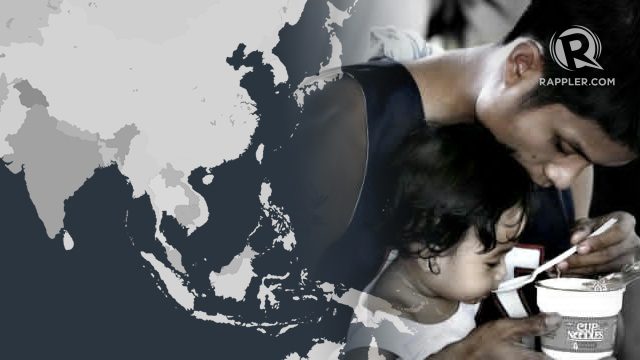SUMMARY
This is AI generated summarization, which may have errors. For context, always refer to the full article.

MANILA, Philippines – An additional $267 billion (P12 trillion)* is needed to be invested annually in social protection programs for global hunger to be eliminated by 2030, a recent report by the United Nations (UN) said.
The required amount, the Achieving Zero Hunger report found out, is needed to be poured into programs and policies intended to uplift the lives of people living in extreme poverty both in rural and urban areas. This would average only $160 (P7,419) per poor person annually over a period of 15 years.
With a relatively meager amount, Food and Agricultural Organization Director-General Graziano da Silva said, this will guarantee they will have better access to food and livelihood.
“Given that this is more or less equivalent to 0.3 percent of the global GDP, I personally think it is a relatively small price to pay to end hunger,” he said in a statement.
The proposed social protection measure will cost $116 billion a year:
- $75 billion (P3 trillion) for rural areas
- $41 billion (P1 trillion) for urban areas
- $105 billion (P4 trillion) for pro-rural poor investments through development and agriculture
- $46 billion (P2 trillion) for pro-urban poor investments
Pro-poor public investments in rural areas will focus on small-scale irrigation, infrastructure, and measures that can ensure reduction of harvest loss and waste, land and water tenure, financial facilities, and other legislations that will help marginalized groups such as women and children.
Meanwhile, additional investments in urban areas ensure support for those living in extreme poverty to attain self-sustainability. Capacity-building projects that will develop entrepreneurial skills and housing can come from investments.
No more ‘business as usual’
According to the last UN report on the Millennium Development Goals, the population living in extreme poverty has been halved. There are now 836 million people surviving under $1.25 in 2015 compared to 1990’s 1.9 billion.
In 2015, at least 175 million are expected to break free from the poverty trap.
However, inequality can be seen in the distribution of progress. Asia and Africa still house the world’s poorest. (READ: Poverty, hunger still threaten MDG)
Meanwhile, Asia Pacific is home to 490 million hungry people – two-thirds of the global total of 730 million.
Ending all forms of poverty and hunger is among the main targets under the Sustainable Development Goals in the latest post-2015 agenda.
Social protection programs can be “effective” in eliminating hunger, poverty, and other related problems if only properly implemented. (READ: Social protection programs vital vs hunger)
However, additional investments are needed to push for zero hunger.
According to the UN report, these are achievable by 2030 only if a new approach that will combine public investments in social protection with efforts from both public and private sectors is done. This move will result in an increase in the productivity of those living in poverty – especially those in agriculture.
Da Silva said, “If we adopt a business-as-usual approach, by 2030, we would still have more than 650 million people suffering from hunger.”
An amount of $1.25 (P57.94) may be enough to cover basic needs, the report said, but it is not sustainable as there would be no savings.
By combining social protection and investments on pro-poor policies and programs, hunger and extreme poverty will be quickly eliminated. In addition, the poor will be able to raise income through means made possible by these investments.
Additional income for those living in extreme poverty means improved productivity. In the long run, the report noted, they will be able to earn and save more enough to lift them up from the poverty trap. – Rappler.com
*$1=P46
Add a comment
How does this make you feel?
There are no comments yet. Add your comment to start the conversation.